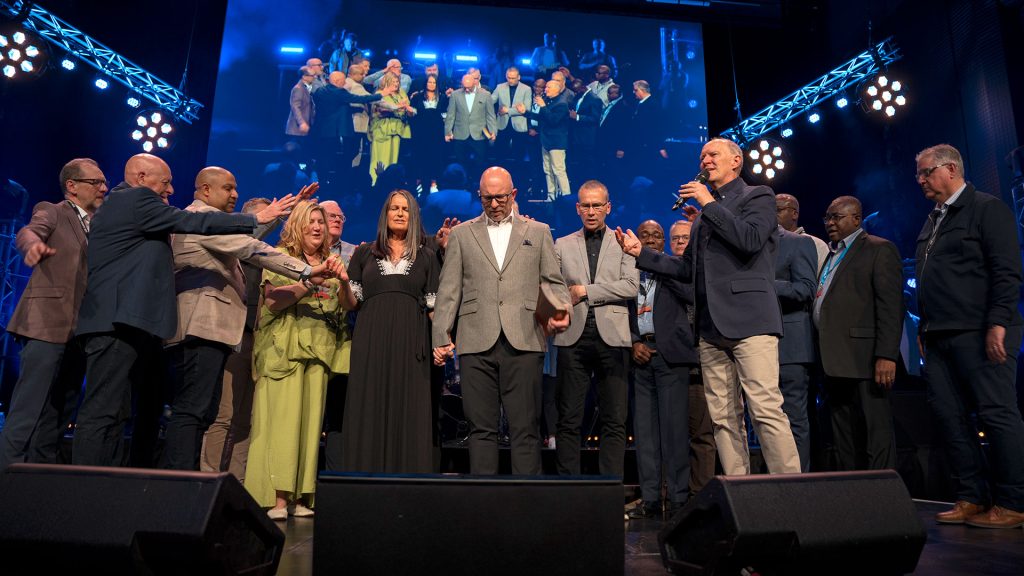Elim Pentecostal Church General Superintendent Rev Mark Pugh chatted to CTE’s Senior Media and Communications Manager Sarah Ball.
SB: Congratulations on your new appointment. Tell us a little about your journey to national leadership.
MP: I’ve done various roles in our denomination. I ran Elim’s National Youth ministry for 10 years and then about six years ago I felt a stir from God that I should step off the national leadership team to concentrate more on the South West. Since then, I’ve been Lead Pastor at the Rediscover Church Exeter.
Normally General Superintendents get appointed from the national leadership team. Then last year I had a stir of the Holy Spirit that something different might happen. So, my wife and I didn’t tell anybody. We just continued praying and seeking God. We wanted it to be really clear that it was him that was opening a door. We received a call in January 2024 asking us for an interview. And so over a period of weeks, I spoke with hundreds of leaders around the country through various Zoom forums to unpack some of the vision and the dream that I have for the next phase of Elim. And I got an 88% majority in the election, which felt like a real mandate. It feels like there’s a real appetite for change.
Incidentally, as a young guy, years ago, I was turned down for ministry. The best drivers fail their first test, so I’m told. I find it quite amazing now that all these years later I’m taking on the role of General Superintendent.

SB: Can you can you share a little bit of your plans and vision?
MP: I think just because something has worked in the past doesn’t mean to say that is the best way in the present. So, everything is on the table for review. There’s no judgment on the past. I’m not after change for change’s sake but there’s a lot of evidence to suggest that we are creaking a little bit structurally and organisationally. We need to change our charity constitution in order to adapt. That’s going to be quite a process and is going to take a lot of political will because it won’t happen overnight.
I’m passionate about church planting and I believe in the years to come we could see hundreds of new churches planted around the country.
A lot of people say to me when I talk about planting churches “What about churches that are already struggling, isn’t it better to put your energies into investing in those?” I read somewhere that someone is four times more likely to accept an invitation to a new church than an established one. If that’s true, it gives a real opportunity for new churches to connect to those people who are outside of it. If I’m being generous 95% of people in the country don’t engage with the local church and if we are planting churches that are trying to move the 5% of people who are already engaging the church around then church planting doesn’t make sense. But if we try to find innovative ways to reach that 95% then it makes real sense.
I’m not trying to build a denomination or a church brand, I’m trying to serve the Kingdom.
…And I want to continue to be involved in the local church in Exeter. I want to continue to “smell the sheep”. Can I say that? I will still put the vacuum around in Exeter. It’ll enable me to not become too theoretical, ivory-towered and detached.
SB: Not trying just to build a denomination, that’s music to an ecumenist’s ears! How do you see Elim working with our other 53 Member Churches?
MP: We have got to fulfil that powerful prayer of Jesus that is still outstanding, so I’m all for unity of heart. I don’t think unity of heart means the same as all being in the same room doing the same thing at the same time. I think our relationships are much deeper than that. When I’ve worked nationally and locally I’ve always sought to build relationships right across the church streams and I’ve been so grateful for learning from other people and their journeys and their traditions.
There’s a great example in South West Awake. We call it the longest prayer meeting in the country. It’s only half an hour long but it’s also 630 miles in length. The longest continuous coastal path in the UK is filled with believers, praying and creating a ring of prayer and praise around the southwest. We had 6,000 people last year. In some areas, multiple groups from different churches have turned up at the same spot and they prayed together for the first time. Others have gone to a really remote part of the coast path. They prayed alone but they’ve known that they were part of this bigger initiative. It’s been wonderful to hear people say it feels so special to do something together.
If there’s a spiritual awakening and a revival happen, what is our response going to be? If it’s jealousy it reveals something in our heart that is unhealthy. It reveals that we haven’t really been praying for God’s revival we have been praying for our significance in that revival.
I pray in this role I’ll be able to build even more connections and relationships across the body of Christ.
SB: Is there anybody or anything from another tradition that has inspired you on your journey of faith?
MP: About 10 years ago I became very inquisitive about Celtic spirituality. As a Pentecostal, we tend to have demonstrative noise when we pray, but sometimes I will take retreat days in places that are from very different traditions with vows of silence. It has helped me discover new aspects of God.

SB: What do you see as some of the challenges for us as churches working together?
MP: Of course, some of the biggest challenges of our day are debates around sexuality. There are strong convictions. We would have a conservative evangelical position. We know we want to be faithful to our understanding of scripture but we also want to make sure that we are loving and compassionate and kind. I think there’s an opportunity for us to honour differences not just try to reconcile them.
In terms of ecclesiology and style of church, I don’t think it’s easy to make a strong case from the scripture about one way of organising ourselves. I think if you ask the question “What is God’s favourite style?” I don’t know where he would land on that. I think he looks at the heart of what we do; not how we do things. I think it’s a bit like the pieces of the jigsaw when they come together they reveal a bigger thing.
SB: The Elim church started in 1915, at a very difficult time in the middle of a world war. We’ve now got a war on the continent of Europe again. How do you reflect on the challenge for churches in contemporary society?
MP: We’re in difficult days. I’m seeing the tensions that exist on the extremities of politics and the polarisation of our society. Jesus said people will know that you are my disciples because you love one another and I think unity has never been more important or more challenging.
I’m seeing more divisions generationally than I’ve ever seen. I know some in the church get a little bit perturbed at a conversation that seems to focus so much on young people. I would say first of all that it makes strategic sense to focus on reaching young people because the majority of people give their lives to Christ before the age of 18. But that doesn’t mean that the rest of the church is redundant. I remember a number of years ago going to a very posh wedding in Italy and I saw something I had only ever seen on TV. That was a pyramid of Champagne glasses and to fill them up they poured from the top. The very top glass overflowed into the next layer and the next and they just kept on. I think that’s what God wants for church. We need all ages. We need an older generation to be filled with God, overflowing with him and sharing their stories with the next generation. We need the church to break the chain of generational separation, we need the generations to unite together.
Explore the Elim Pentecostal Church.
All photos copyright Elim Pentecostal Church.